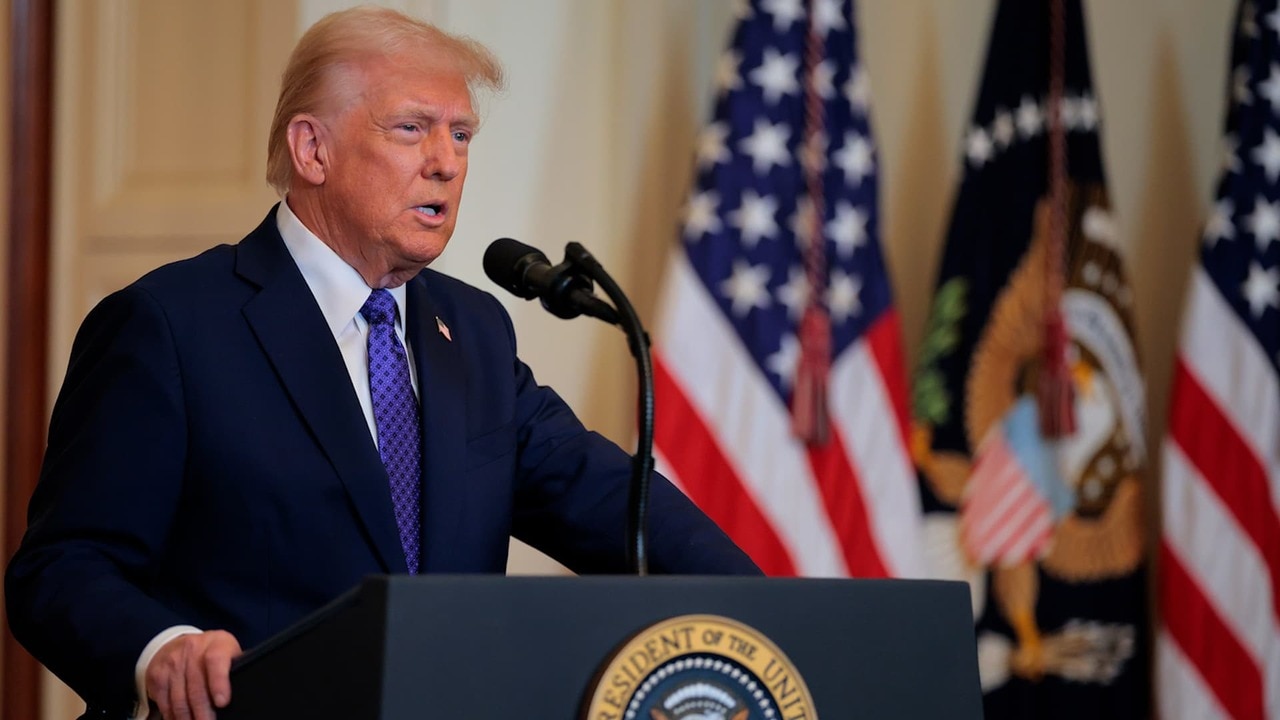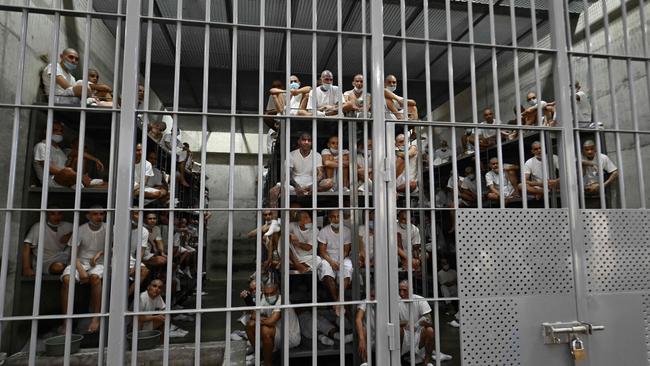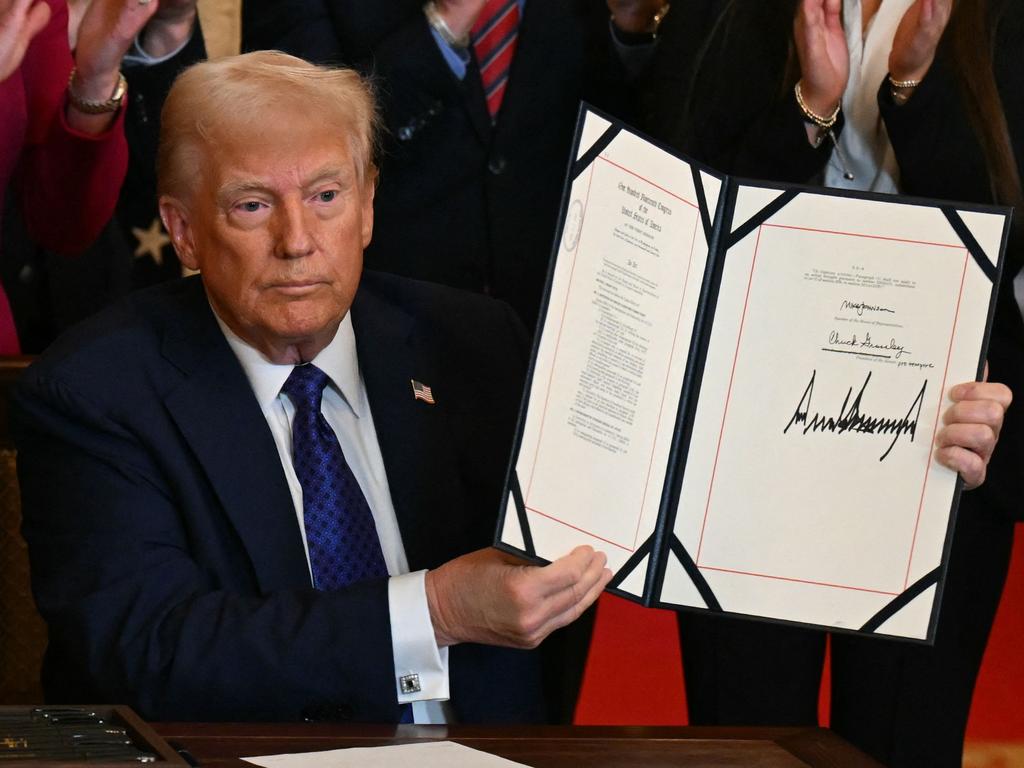The Salvadoran mega-prison offering to take America’s worst criminals
Lockup currently houses thousands of members of gangs that terrorised the Central American country for decades.
No visits from wives, girlfriends or children. Sleeping arrangements are stainless-steel cots stacked several layers high in large cells packed with dozens of inmates. And roommates include some of the senior leadership of Latin America’s most notorious gangs.
The harsh conditions of El Salvador’s Confinement Center for Terrorism, a mega-prison opened in 2023, are currently reserved for thousands of gang members who terrorised the country for decades. If President Nayib Bukele and President Trump have their way, America’s worst criminals are destined for El Salvador’s biggest prison as well.
Bukele offered the U.S. use of the prison, known as CECOT, during a visit this week from Secretary of State Marco Rubio, who said the Trump administration would be open to deporting to El Salvador both criminal migrants and American citizens. Rubio said the legal basis for sending U.S. nationals to a foreign prison would need to be studied, something Trump acknowledged to reporters.
“If we had the legal right to do it, I would do it in a heartbeat,” Trump said in the Oval Office Tuesday. “I don’t know if we do or not. We’re looking at that right now, but we could make deals where we’d get these animals out of our country.” Sending Americans to serve their sentences in a foreign prison would prompt court challenges, according to legal experts. The U.S. Constitution entitles citizens to medical care, basic hygienic living conditions and protection from excessive force. A federal statute requires incarcerated individuals to be placed within a few hundred miles of their primary residences.

Protests across US cities against Trump’s anti-migrant crackdownThousands of demonstrators in cities across the US are protesting President Donald Trump’s crackdown on undocumented immigrants.
However the legal fights play out, Trump’s push to deport migrants has given Bukele another chance to highlight his crime-fighting efforts and the prison that many experts have said helped transform a country once known for having the world’s highest murder rate into one of the safest in Latin America, in just a few years.
Regarded as the world’s largest correctional facility, the mega-prison was intended to hold up to 40,000 members of the street gangs that long held sway in this Massachusetts-size country of 6.3 million. Before CECOT, gangs largely controlled the prisons. Some facilities were called crime universities and command centres for rackets.
When CECOT opened, Bukele, who cut his teeth at his family’s advertising firm, posted videos on social media showing convoys of buses arriving at dawn at the facility, a labyrinth of concrete and steel watched by armed prison guards and soldiers from towers almost 50 feet high.
The video recordings showed guards in riot gear corralling the handcuffed inmates, barefoot, shirtless, their heads shaved and their torsos and faces covered with gothic-style tattoos as a tenebrous soundtrack played in the background. There are now close to 15,000 convicted gang members there.
“They will spend the rest of their lives in prison,” Security Minister Gustavo Villatoro said at the time. Most of the imprisoned gang members were responsible for more than 80,000 deaths in the past 30 years, he said.
Bukele warned that if gangs moved to retaliate, “I swear to God they won’t eat a grain of rice, and we’ll see how long they last.” The huge, gleaming prison has captured the imagination of hard-line conservatives around the globe — especially in the U. S. A host of Trump’s allies have visited the centre and posed for photos in its halls, hailing Bukele’s aggressive crackdown as a model to be emulated.
Bukele said any fees for holding American prisoners would be easy for the U.S. to handle, and a boon to his smaller country.
Trump had floated the idea before, in language that Bukele appeared to echo on Monday. “Let them be brought to a foreign land and maintained by others for a very small fee,” Trump said at a conference in Miami last month.
Human-rights groups said the new facility was another step toward authoritarian rule under Bukele, who took office in 2019 and began arresting suspected gang members en masse in 2022. Since then, he has ruled under emergency powers that suspend civil liberties including due process. El Salvador now has the world’s highest incarceration rate — about triple that of the U.S., according to World Prison Brief, which tracks security and prison data.
Activists accused the Bukele administration of thousands of arbitrary detentions. At CECOT, a ban on jail visits meant that many children were unable to see their parents, causing psychological damage, rights groups said.

“El Salvador wants everyone to think we’re a first-world country now, the most secure place in the world,” said Alfredo Mejía, head of the rights group Movir, which advocates for families of detainees. “But we have no guarantees, no rights.” For 33 months, Mejía said, his 25-year-old daughter, Carla Mejía, has been among those arrested under Bukele’s antigang effort and hasn’t been able to consult a lawyer or her family, which maintains that she is innocent. Each month, Mejía said he has to deliver a box of basic food and hygiene products to the prison, supplies that set him back about $125, a hefty toll in a country where people on average make less than $500 monthly.
Movir has received scores of complaints from detainees’ families over the unpaid labor that prisoners are forced to perform — such as sewing police and school uniforms. Families said they are asked to pay bribes of up to $500 to visit their loved ones for 20 minutes. “They turned it into a business,” Mejía said. “I call it exploitation.” In El Salvador, many believe that gang members are suffering a punishment proportional to the abuses they committed against the population, especially against the poorest sectors of society. Street gangs took root in the 1980s in the Salvadoran immigrant community in Los Angeles. As the U.S. began to deport gang members, El Salvador became fertile ground for the start-up of criminal enterprises. Multilateral development banks estimated that crime cost El Salvador some 15% of its $34 billion economy each year.
As the security crusade took hold, business began to flourish in town plazas and street markets where extortion rackets of the gangs had prevailed, with children and teens retaking once-deserted public spaces to play soccer or basketball.
The improvement of security conditions also led to a significant slowdown in U.S.-bound migration.
Early last year, Bukele won re-election with 88% of the votes, a record for any democratically elected leader in Latin America, and leaders elsewhere have sought to apply “the Bukele model” to cut down on crime.
The Wall Street Journal



